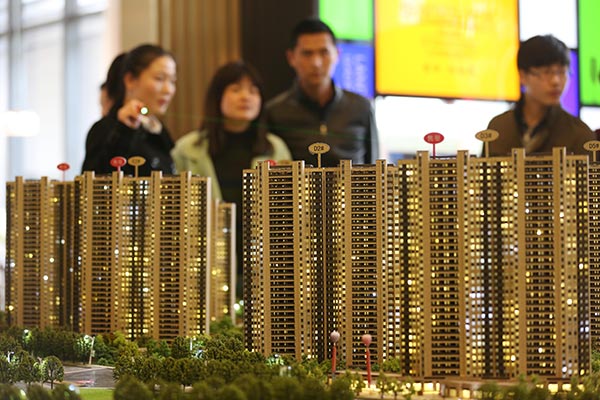

Economic downturn, lower financing costs behind the move: experts

A growing number of State-owned enterprises (SOEs) are marching into China's skyrocketing real estate market, due to their privileged credit policy and the country's sluggish economic growth, experts noted on Tuesday.
The experts also warned that the move could exacerbate China's housing bubble and will have broad implications for China's long-term economic growth.
In the first half of 2016, the number of SOEs on the list of China's top 50 property companies in terms of sales performance climbed to 22, up from 20 in the same period last year, according to a report Centaline Property sent to the Global Times on Tuesday.
Based on calculations by the Global Times, the sales revenues generated by those SOEs rose 63.2 percent year-on-year to 1.02 trillion yuan ($179.9 billion) in the first six months, accounting for 55 percent of total sales by the listed property companies.
SOEs, whose main business does not extend into the property market, saw their names added to the list after they posted stellar profits in the real estate market.
Aerospace company Aviation Industry Corporation of China and power firm Luneng Group Co posted revenues of 20 billion yuan and 27.4 billion yuan, respectively, from the property market in the first half of the year, according to the report.
The rising number of SOEs flocking into the real estate market has also prompted frenzied land bidding wars in first- and second-tier cities, said Yan Yuejin, the research director at E-house China R&D Institute.
Cinda Property, an affiliate of the Ministry of Finance, has bid for seven "land king" sites - property that is bought for record-breaking prices - in deals worth 35.2 billion yuan since June 2015, the Economic Observer newspaper reported on September 4.
Among the 105 "land king" transactions in the first half of the year, 52 were bid for by SOEs, according to the Centaline Property report. The total amount paid by SOEs for the property buys was 178.6 billion yuan, or 54.3 percent of the total transactions volume.
Property benefits
China's economic downturn and the relatively lower financing cost for SOEs are among the major reasons behind this move into the property sector by SOEs, experts noted.
SOE investments in real sectors, like in the manufacturing industry, are currently suffering from a prolonged period of low profitability due to the economic downtown, according to experts.
"Property is one of the few sectors that still promises quick and high returns," Yan told the Global Times on Tuesday, "It's a panacea for the SOEs that have run out of options."
Additionally, the SOEs "enjoy a preferential credit policy and commercial banks favor lending to them for guaranteed returns," Zhang Dawei, an analyst with Centaline Property, told the Global Times on Tuesday.
Compared with private real estate companies, the loans issued to their State-owned counterparts are generally 3 percentage points lower in terms of interest rates, Zhang noted.
Benefiting from an abundance of capital, SOEs also have a competitive advantage in vying for land against private companies, said Zhang.
Conflicting challenges
Yet the rise in land prices "drives up the price of property and enlarges the sector's high leverage ratio, which ultimately pushes the looming housing bubble one step closer to the bursting point," Zhang said.
At a time when SOEs are thwarting the central government's agenda, this phenomenon of more SOEs in the property market highlights the long-debated confliction between the government's industrial development plan and market-oriented economy, experts noted.
In 2010, the State-owned Assets Supervision and Administration Commission rolled out measures ordering a number of SOEs to withdraw from the real estate sector.
In contrast, various government-backed enterprises are now turning to the property market as they strive to diversify their investment portfolio.
The SOEs are "neither allocating capital to sectors, like high-tech industry and other innovative sectors, that will revitalize China's economy and where private companies were less motivated to invest, nor are they carrying out destocking reforms to reduce housing inventories in third- and fourth-tier cities," Yan noted.
"The SOEs were supposed to follow the government's reform schedule, but they also need to consider their own profitability," Yan said.
"This is the biggest challenge that the government faces," he said.
 Fire brigade in Shanghai holds group wedding
Fire brigade in Shanghai holds group wedding Tourists enjoy ice sculptures in Datan Town, north China
Tourists enjoy ice sculptures in Datan Town, north China Sunset scenery of Dayan Pagoda in Xi'an
Sunset scenery of Dayan Pagoda in Xi'an Tourists have fun at scenic spot in Nanlong Town, NW China
Tourists have fun at scenic spot in Nanlong Town, NW China Harbin attracts tourists by making best use of ice in winter
Harbin attracts tourists by making best use of ice in winter In pics: FIS Alpine Ski Women's World Cup Slalom
In pics: FIS Alpine Ski Women's World Cup Slalom Black-necked cranes rest at reservoir in Lhunzhub County, Lhasa
Black-necked cranes rest at reservoir in Lhunzhub County, Lhasa China's FAST telescope will be available to foreign scientists in April
China's FAST telescope will be available to foreign scientists in April "She power" plays indispensable role in poverty alleviation
"She power" plays indispensable role in poverty alleviation Top 10 world news events of People's Daily in 2020
Top 10 world news events of People's Daily in 2020 Top 10 China news events of People's Daily in 2020
Top 10 China news events of People's Daily in 2020 Top 10 media buzzwords of 2020
Top 10 media buzzwords of 2020 Year-ender:10 major tourism stories of 2020
Year-ender:10 major tourism stories of 2020 No interference in Venezuelan issues
No interference in Venezuelan issues
 Biz prepares for trade spat
Biz prepares for trade spat
 Broadcasting Continent
Broadcasting Continent Australia wins Chinese CEOs as US loses
Australia wins Chinese CEOs as US loses